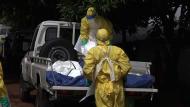Close this windowBy using Yahoo you agree that Yahoo and partners may use Cookies for personalisation and other purposes
Skip to search.
Developing
- US: Captured Pilot's Plane Not Downed By ISSky News - 23 minutes ago
- Glasgow: Woman Saw Daughter And Parents KilledSky News - 39 minutes ago
- CCTV Shows Moment Before Officer Shot TeenSky News - 42 minutes ago
- High Street Sales To Reach £342bn In 2014Sky News - 5 hours ago
- Former US President George Bush Snr In HospitalSky News - 7 hours ago
A trial for an experimental Ebola vaccine has been found to be safe for use specifically in Africa.
Two experimental DNA vaccines to prevent Ebola and the closely related Marbug virus were trialled.With more than 7,000 deaths caused by Ebola in West Africa scientists are working tirelessly to fight the outbreak which is now in its 12th month.
The lead author, Dr Julie Ledgerwood from the National Institutes of
Allergy and Infectious Diseases (NIAID) said: "This is the first study
to show comparable safety and protection of an experimental Ebola
vaccine in an African population.
"This is particularly encouraging because those at greatest risk of
Ebola live primarily in Africa, and diminished vaccine protection in
African populations has been seen for other diseases."
Scientists from the NIAID developed the DNA vaccines that code for
Ebola virus proteins from the Zaire and Sudan strains, and the Marburg
virus protein.The vaccines contain the construction plans for the proteins on the outer surface of the virus. Immune responses against these proteins have shown to be highly protective in non-human primate models.
In this phase one trial, the Makerere University Walter Reed Program enrolled 108 healthy Ugandan adults aged between 18 and 50 between November 2009 and April 2010.
Each volunteer was randomly assigned to receive an intramuscular injection of either the Ebola vaccine, Marburg vaccine, both vaccines, or a placebo at the start of the study, and again four weeks and eight weeks later.
The vaccines given separately and together were safe and stimulated an immune response in the form of neutralising antibodies and t-cells against the virus proteins.
Four weeks after the third injection, 57% (17 out of 30) of the volunteers had an antibody response to the Ebola Zaire protein as did 14 out of 30 participants who received both the Ebola and Marburg vaccines.
However, the antibodies were not long-lasting and returned to undetectable levels within 11 months of vaccination.
Both DNA vaccines were well tolerated in Ugandan adults with similar numbers of local and systemic reactions reported in all groups.
Only one serious adverse event was reported in a Marburg vaccine-only recipient, but was not thought to be vaccine related.
The latest findings have already formed the basis of a more potent vaccine now undergoing trials. It is a significant step in the fight against the disease.
Best of Yahoo News
-
0users liked this commentPlease sign in to rate a Thumb UpPlease sign in to rate a Thumb Down0users disliked this commentPatricia • Report Abuse
Anythings worth a try, the same as yellow fever penicillin and all new vaccines of there time they had to be tried sometime to prove there worth lets hope this one works.
Reply -
0users liked this commentPlease sign in to rate a Thumb UpPlease sign in to rate a Thumb Down0users disliked this commentSteve • Report Abuse
Stay well away from any new world order vaccines. Ebola was a scam that was just more media lies and fear porn to push for vaccines that all should run from.
Reply -
0users liked this commentPlease sign in to rate a Thumb UpPlease sign in to rate a Thumb Down0users disliked this commentPeter O • Report Abuse
Poor Africa,the test Lab for the US of AIPAC.
Reply
Editor's Picks
1 - 4 of 20
Today on Yahoo
1 - 8 of 40
News for you

Review: Who needs a separate camera with these 3 phones?
Tue, Dec 23, 2014
Lakers stun Warriors 115-105 without Kobe
14 hours agoAnti-Islam Rally Attracts 17,000 In Germany
Tue, Dec 23, 2014
Saudi issues 'final warning' on high-speed rail project
2 hours 12 minutes ago
Singer Joe Cocker Dies At 70
Tue, Dec 23, 2014





No comments :
Post a Comment